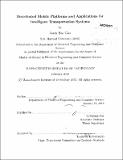| dc.contributor.advisor | Li-Shiuan Peh. | en_US |
| dc.contributor.author | Gao, Jason Hao | en_US |
| dc.contributor.other | Massachusetts Institute of Technology. Department of Electrical Engineering and Computer Science. | en_US |
| dc.date.accessioned | 2013-06-17T19:56:29Z | |
| dc.date.available | 2013-06-17T19:56:29Z | |
| dc.date.copyright | 2013 | en_US |
| dc.date.issued | 2013 | en_US |
| dc.identifier.uri | http://hdl.handle.net/1721.1/79327 | |
| dc.description | Thesis (S.M.)--Massachusetts Institute of Technology, Dept. of Electrical Engineering and Computer Science, 2013. | en_US |
| dc.description | Cataloged from PDF version of thesis. | en_US |
| dc.description | Includes bibliographical references (p. 70-75). | en_US |
| dc.description.abstract | Smartphones are pervasive, and possess powerful processors, multi-faceted sensing, and multiple radios. However, networked mobile apps still typically use a client-server programming model, sending all shared data queries and uploads through the cellular network, incurring bandwidth consumption and unpredictable latencies. Leveraging the local compute power and device-to-device communications of modern smartphones can mitigate demand on cellular networks and improve response times. This thesis presents two systems towards this vision. First, we present DIPLOMA, which aids developers in achieving this vision by providing a programming layer to easily program a collection of smartphones connected over adhoc wireless. It presents a familiar shared data model to developers, while underneath, it implements a distributed shared memory system that provides coherent relaxed-consistency access to data across different smartphones and addresses the issues that device mobility and unreliable networking pose against consistency and coherence. We evaluated our prototype on 10 Android phones on both 3G (HSPA) and 4G (LTE) networks with a representative location-based photo-sharing service and a synthetic benchmark. We also simulated large scale scenarios up to 160 nodes on the ns-2 network simulator. Compared to a client-server baseline, our system shows response time improvements of 10x over 3G and 2x over 4G. We also observe cellular bandwidth reductions of 96%, comparable energy consumption, and a 95.3% request completion rate with coherent caching. With RoadRunner, we apply our vision to Intelligent Transportation Systems (ITS). RoadRunner implements vehicular congestion control as an in-vehicle smartphone app that judiciously harnesses onboard sensing, local computation, and short-range communications, enabling large-scale traffic congestion control without the need for physical infrastructure, at higher penetration across road networks, and at finer granularity. RoadRunner enforces a quota on the number of cars on a road by requiring vehicles to possess a token for entry. Tokens are circulated and reused among multiple vehicles as they move between regions. We implemented RoadRunner as an Android application, deployed it on 10 vehicles using 4G (LTE), 802.11p DSRC and 802.11n adhoc WiFi, and measured cellular access reductions up to 84%, response time improvements up to 80%, and effectiveness of the system in enforcing congestion control policies. We also simulated large-scale scenarios using actual traffic loop-detector counts from Singapore. | en_US |
| dc.description.statementofresponsibility | by Jason Hao Gao. | en_US |
| dc.format.extent | 75 p. | en_US |
| dc.language.iso | eng | en_US |
| dc.publisher | Massachusetts Institute of Technology | en_US |
| dc.rights | M.I.T. theses are protected by
copyright. They may be viewed from this source for any purpose, but
reproduction or distribution in any format is prohibited without written
permission. See provided URL for inquiries about permission. | en_US |
| dc.rights.uri | http://dspace.mit.edu/handle/1721.1/7582 | en_US |
| dc.subject | Electrical Engineering and Computer Science. | en_US |
| dc.title | Distributed mobile platforms and applications for intelligent transportation systems | en_US |
| dc.type | Thesis | en_US |
| dc.description.degree | S.M. | en_US |
| dc.contributor.department | Massachusetts Institute of Technology. Department of Electrical Engineering and Computer Science | |
| dc.identifier.oclc | 844771639 | en_US |
